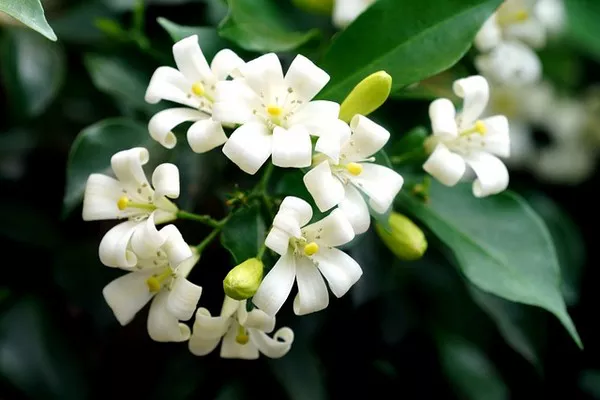Flowers have long held a special place in human culture, often serving as potent symbols of love, beauty, and emotion. Among these, the jasmine flower stands out as a fragrant emblem of diverse cultural significance. With its delicate white petals and intoxicating scent, the jasmine flower has captured the hearts and imaginations of people worldwide. In this article, we will explore the rich symbolism of the jasmine flower, uncovering the many layers of meaning associated with this captivating bloom.
A Brief Introduction to Jasmine
Before diving into the symbolism of the jasmine flower, it’s essential to understand the plant itself. Jasmine is a genus of flowering plants in the olive family (Oleaceae) that includes over 200 species. It is native to tropical and subtropical regions of Eurasia, Australasia, and Oceania. However, the most well-known and widely cultivated species is Jasminum officinale, commonly known as common jasmine or poet’s jasmine.
Common jasmine is a deciduous or evergreen climbing shrub that produces delicate, white, star-shaped flowers. These flowers are known for their sweet, heady fragrance, which intensifies at night, making them a popular choice for evening gardens and perfumes. The jasmine plant is cherished not only for its aesthetics and aroma but also for its cultural and symbolic significance.
Love and Romance
One of the most prevalent and universal symbols associated with jasmine is that of love and romance. In many cultures, the jasmine flower is seen as a token of affection, passion, and sensuality. Its delicate appearance and sweet fragrance make it a perfect gift for expressing love and desire.
In Hindu culture, jasmine is sacred to the goddess Shakti, who embodies femininity, fertility, and divine energy. Jasmine garlands are often used in Hindu weddings and ceremonies to symbolize the purity and auspiciousness of the union.
Similarly, in Persian culture, the jasmine flower is an enduring symbol of love and longing. Persian poets have often used jasmine metaphors to describe the beauty and allure of a beloved. The fragrance of jasmine is said to evoke feelings of passion and desire, making it a popular choice for love potions and perfumes.
Purity and Innocence
In contrast to its association with love and romance, the jasmine flower also symbolizes purity and innocence in many cultures. Its pristine white petals are often seen as a representation of purity and simplicity.
In Buddhism, jasmine is a symbol of purity, and it is often offered at Buddhist altars as a sign of respect and devotion. It represents the purity of heart and mind, free from the distractions and impurities of the world.
In some Western traditions, the jasmine flower is associated with purity and virtue. It is sometimes used in bridal bouquets to symbolize the bride’s innocence and the purity of her love.
Spirituality and Enlightenment
Beyond its associations with love and purity, the jasmine flower also carries spiritual and metaphysical significance in various cultures. In Hinduism, jasmine is believed to have a divine essence and is offered to gods and goddesses as a gesture of devotion and reverence. The flower’s fragrance is said to symbolize the spiritual journey toward enlightenment and self-realization.
In Sufi mysticism, jasmine is often used as a symbol of the soul’s journey toward union with the divine. The intoxicating scent of jasmine is thought to represent the divine presence and the yearning for spiritual enlightenment.
Femininity and Beauty
The delicate and graceful appearance of the jasmine flower has led to its association with femininity and beauty in many cultures. In ancient Greek mythology, Jasmine was associated with the goddess Aphrodite, the epitome of beauty and love. It was believed that the goddess used jasmine to enhance her own radiant beauty.
In Chinese culture, jasmine is often associated with femininity and grace. The flower’s fragrance is believed to enhance a woman’s charm and elegance, making it a popular choice for hair adornments and perfume.
Hope and Good Fortune
In some cultures, the jasmine flower symbolizes hope, good fortune, and positive outcomes. Its delicate blossoms are often seen as a harbinger of happiness and prosperity.
In the Philippines, jasmine is known as “Sampaguita” and is considered the national flower. It symbolizes purity, simplicity, and humility, and it is often used in religious offerings and as a symbol of national pride.
Death and Mourning
While jasmine is primarily associated with positive symbolism, it also carries some connotations of sorrow and loss. In certain cultures, jasmine flowers are used in funerals and memorial services to symbolize the fleeting nature of life and the hope for a peaceful afterlife.
In parts of Asia, including India and Sri Lanka, jasmine garlands are placed on the bodies of the deceased as a gesture of respect and to mask the scent of decay. In this context, jasmine represents the transition from the material world to the spiritual realm.
Cultural Variations in Jasmine Symbolism
It’s important to note that the symbolism of the jasmine flower can vary widely from one culture to another. While some themes, such as love and purity, are relatively consistent across cultures, others may differ significantly. The specific meanings associated with jasmine can be influenced by regional traditions, religious beliefs, and historical contexts.
Conclusion
The jasmine flower is a botanical masterpiece that weaves a fragrant tapestry of meanings across cultures and centuries. Its symbolism encompasses love, purity, spirituality, femininity, hope, and even the contemplation of mortality. Whether it graces a wedding ceremony, an altar of devotion, or a garden at dusk, the jasmine flower remains a timeless and evocative symbol that resonates with the human experience. Its delicate beauty and intoxicating fragrance continue to capture our hearts and inspire poets, artists, and lovers around the world, reminding us of the profound power of nature’s symbols to convey the complexities of human emotion and existence.


